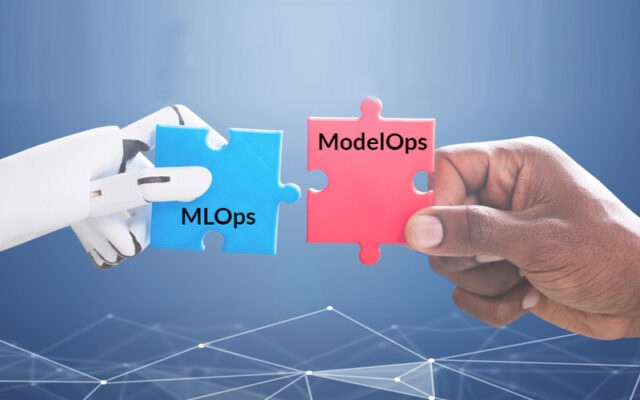These two concepts have for a long time been marked with confusion. People often use the words interchangeably, but the reality is that they have different meanings. However, it is vital to understand each and know the features they provide and the critical distinctions between them.
This article will look to clear up the confusion that exists in the industry. It will also explain the value of the two and their various use cases. By the end, you should distinguish between MLOps and ModelOps clearly and avoid using them interchangeably in the future.
Let’s get started.
What is MLOps?
Machine learning operations (MLOps) is a concept that unites ML systems development and deployment. It aims at standardizing and streamlining the continuous delivery of high-performing models. MLOps has helped make work easier for teams that handle big data in organizations.
Unlike before, businesses today face a lot of technical challenges when dealing with data. This has made it necessary to adopt systems that can help simplify their work. Using MLOps makes it easier for businesses to base their decision-making on data and, in the end, reduce guesswork.
Working with MLOps requires one to have various skills. For instance, you can have the ability to frame ML problems from business objectives. You also should be able to architect ML and data solutions for the problem. Also, data science and engineering skills can be helpful in this.
What is ModelOps?
On the other hand, AI model operationalization (ModelOps) is a process that involves working with analytic models. It entails the production, management, scaling, monitoring, and improvement of models. But then, it is wide and goes beyond machine learning models.
Gartner explains that ModelOps majorly focuses on the management of models. It entails the governance of models and ML lifecycle management. But then, model management is one of the challenging business tasks, yet a very vital aspect in ModelOps.
Therefore, businesses prefer to outsource model management to experts. Outsourcing gets the daunting work of building, managing, deploying, and monitoring models out of the way. In the end, it helps manage risks, cut costs, boost efficiency and increase revenues.
Difference Between MLOps and ModelOps
It is also vital to understand the difference between MLOps and ModelOps. And there are two major differentiating factors between these two. They include;
- MLOps’s primary focus is on machine learning models, while ModelOps focuses more on operationalizing all AI models you can think of.
- MLOps provides teams with tools to enable them to collaborate better. ModelOps, on the other hand, aims to provide transparency and autonomy for AI teams by using dashboards and reporting.
In short, MLOps helps data scientists test and deploy ML models. ModelOps, on the other hand, entails the governance of models to ensure accountability and validation of all models. Also, there are other differences in the applications of MLOps and ModelOps, as you’ll see below.
MLOps Vs. ModelOps: Use Cases and Who Uses Them
Knowing the use cases of MLOps and ModelOps is vital. But it is also essential to know who uses them. As mentioned before, MLOps helps teams develop machine learning models. It plays a central role in the entire process, from the actual coding to the retaining of ML models.
The users of MLOps are mainly data scientists. In almost every organization, it is mainly a data scientist’s work to develop models. They also play a vital role in identifying the correct data and data sets for every model they develop and deploy to achieve their goals.
ModelOps helps ensure that teams get the desired outcomes from various models. As said earlier, everything that’s under model management is ModelOps. It entails the production of models and the process of ensuring that models are reliable and meet regulatory requirements.
The users of ModelOps are Chief Information Officers and IT teams. They are responsible for developing a robust ModelOps platform for their organizations. ModelOps helps them make reliable decisions that can ensure that a specific unit or the entire business gets good results.
The Value of MLOps and ModelOps
It is worth mentioning that MLOps and ModelOps are complementary. One cannot replace the other; instead, they work in tandem. We have looked into their use cases, and the roles they play are different. Thus, you need them both in an organization for you to reach your goals.
In summary, you cannot use ModelOps to develop a machine learning model. Similarly, MLOps cannot help you manage models; instead, it will only help you develop them. This is why you can’t substitute one for another and why they are all valuable for a firm.
The bottom line is that both are AI tools that can significantly speed up processes. They are worth considering if you are looking to add speed to your operations. Combining the power that these two concepts have can help take your business to the next level.
Conclusion
As mentioned in the introduction, you should be able to differentiate MLOps and ModelOps by now. This article has provided clear definitions of the two to get the confusion out of the way. It has also provided insight into the different tasks that these two can help you perform.
In addition, it has taken a more in-depth look into who can use MLOPs and ModelOps. The former, as discussed above, mainly gets used by data scientists. These people develop models for businesses, and they may not do without MLOps in their work.
On the other hand, ModelOps gets used by Chief Information Officers and IT experts. These are the people who play a massive role in the management of organizations. They also help manage models, and that’s why they need ModelOps to do this more efficiently.
In the end, we have looked into the value of MLOps and ModelOps. As said before, they are both valuable and complement each other. Thus, it is not possible to drop either of them if you use machine learning and models.
They are, therefore, both valuable and worthwhile, so you should consider adopting them in your business. They will increase the efficiency of your team by supporting data scientists and application engineers in their work. That will make it easy to reach your business goals.
Read Dive is a leading technology blog focusing on different domains like Blockchain, AI, Chatbot, Fintech, Health Tech, Software Development and Testing. For guest blogging, please feel free to contact at readdive@gmail.com.





